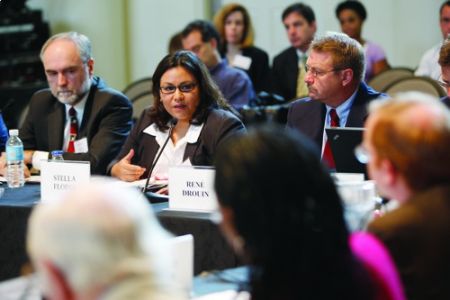The impact of the nation’s current economic downturn on low- and moderate-income students was the topic of an all-day national roundtable discussion on June 13 at Peabody.

The panel was hosted by the U.S. Department of Education’s Advisory Committee on Student Financial Assistance, which recently released data that show millions of college-qualified high school graduates encounter significant financial barriers that may worsen considerably over the next decade.
John Gaines, director of enrollment management for Vanderbilt, introduced the roundtable. Stella Flores, assistant professor of public policy and higher education, participated in the roundtable’s first session, which examined how deteriorating economic conditions may affect institutional financing, state appropriations, charitable giving, grant aid from all sources, and work and loan funds.
In addition to Flores, the first session panelists included: Eduardo J. Padron, president, Miami Dade College; Nancy Moody, president, Lincoln Memorial University; Brett Lief, president, National Council of Higher Education Loan Programs; John Nelson, managing director for health care, higher education and infrastructure, Moody’s Public Finance Group; Charles S. Lenth, vice president for policy analysis and academic affairs, State Higher Education Executive Officers; and Harris Miller, president, Career College Association.
The second session focused on additional steps that federal, state, institutional and private parties may need to take to ensure student access and success moving forward. Panelists for this session were Hazel O’Leary, president, Fisk University; David Gregory, vice chancellor for administration and facilities management, Tennessee Board of Regents; Richard G. Rhoda, executive director, Tennessee Higher Education Commission; Philip R. Day, Jr., president and CEO, National Association of Student Financial Aid Administrators; Patrick M. Callan, president, National Center for Public Policy and Higher Education; Sarita E. Brown, president, Excelencia in Education; and Deanne Loonin, director, Student Loan Borrower Assistance Project, National Consumer Law Center.